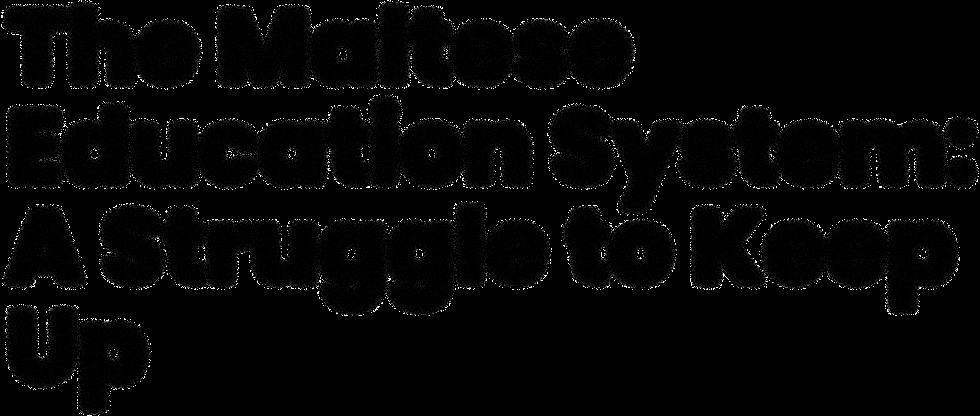





















“We defend the rights of students. No government, private entity or political party is beyond scrutiny”
Written and Illustrated by SDM. For students, by students.
Published by SDM
Studenti Demokristjani Maltin Office 2, Student’s House University of Malta, Mside
E-mail: presdient.sdm@gmail.com Website: https://www.sdm.mt For further information about the content of this publication, please contact: mediateam.sdm@gmail.com
The Maltese education system, like many others worldwide, strives to keep pace with better-performing systems such as those in the United Kingdom and other European countries.
However, despite these efforts, the system often falls short due to a combination of oversaturation, poorly structured courses, and an apparent disconnect between academic offerings and real-world job requirements. This document examines the challenges within the Maltese education system, highlighting how these issues manifest in the lived experiences of students, particularly those pursuing degrees such as the Bachelor of Commerce (BCOM). The analysis is supported by survey data reflecting student and public sentiment regarding the current state of education in Malta.
Malta’s education system has undergone significant reforms in recent years, with the aim of aligning its standards with those of leading educational systems. These efforts include curriculum changes, the introduction of new courses, and an increased emphasis on inclusivity and modern teaching methods.
However, these initiatives, while well-intentioned, often result in an oversaturated educational landscape where courses are added without sufficient consideration for their coherence and effectiveness.
Survey data reveals a general dissatisfaction among students with the current education system. Many respondents expressed frustration, with comments ranging from “very dissatisfied” to “neither satisfied nor dissatisfied.” This dissatisfaction suggests that despite the system’s attempts to modernize and expand, it is failing to meet the needs of its users—students.
One of the critical issues facing the Maltese education system is the oversaturation of courses. In an attempt to offer a broad array of subjects and specializations, the system has inadvertently diluted the quality of education.
Courses are often put together hastily, lacking the necessary depth and structure to provide students with a meaningful and comprehensive education.
For instance, students pursuing a Bachelor of Commerce (BCOM) degree frequently report that their courses lack real-world applicability. The survey results underscore this concern, with many students highlighting the absence of practical experience within their programs.
One respondent noted, “The BCOM course does not prepare you for the job market. It’s left to the student to gain real-world experience, which is what the degree should be providing.” This sentiment reflects a broader issue within the system, where the intrinsic value of courses is lost amidst an overwhelming array of options that fail to deliver on their promises.
A fundamental purpose of higher education is to prepare students for the workforce. However, the Maltese education system appears to struggle with this mandate.
The survey data indicates that a significant portion of respondents do not believe that the current system adequately prepares students to reach their career goals. This disconnect is particularly evident in fields such as engineering, where practical experience and industry connections are crucial for success.
One respondent’s comment encapsulates this issue: “A degree should prepare you for the real world in a structured manner, where everything you need is taught within a specific timeframe. In Malta, this isn’t happening.”
The lack of practical training and real-world application in courses like engineering leaves students ill-equipped to navigate the job market, placing an undue burden on them to seek out internships, part-time jobs, and other opportunities independently. This situation undermines the very purpose of a degree, which should be to equip students with the skills and knowledge they need to succeed in their chosen careers.
While oversaturation and poor course structure are significant issues, the Maltese education system also struggles with inclusivity, particularly regarding students with special educational needs. The survey responses indicate a mixed perception of the resources and support available to these students.
Some respondents acknowledge the efforts made to accommodate diverse learning needs, while others express concern over the adequacy of these provisions.
For example, one respondent suggested that the system needs “more personalized learning paths” to better cater to individual student needs, particularly those requiring special education. This suggestion aligns with broader calls for reform within the system, emphasizing the need for a more tailored approach that recognizes and addresses the unique challenges faced by different student groups.
To address these challenges, se eral key reforms are necessary
Curriculum O erhaul The curriculum should be streamlined to focus on quality o er quantity. Courses should be designed with clear objecti es, ensuring that they ro ide students with the necessary skills and knowledge for their future careers
Practical E erience Integration Programs should incor orate ractical e erience as a core com onent. Partnershi s with industry, mandatory internshi s, and roject based learning can bridge the ga between academic knowledge and real world a lication
Personalized Learning The system should mo e towards more ersonalized learning aths, allowing students to tailor their education to their s ecific needs and career goals. This a roach would also better su ort students with s ecial educational needs, ro iding them with the resources and guidance they require to succeed
Teacher Training In estment in teacher training is essential to ensure that educators are equi ed with the skills and knowledge to deli er high quality education. This training should include methods for integrating ractical skills into the curriculum and su orting di erse learning needs
ystemic Reform A com rehensi e re iew of the education system is necessary to identify and address its underlying issues. This reform should in ol e all stakeholders, including students, educators, industry leaders, and olicymakers, to create a cohesi e and effecti e educational framework.
The Maltese education system is at a crossroads. While it strives to emulate the success of better-performing systems, it must address significant internal challenges that hinder its progress.
The oversaturation of courses, lack of practical experience, and insufficient support for students with special needs are critical issues that need to be addressed. By implementing targeted reforms, Malta can create an education system that not only keeps pace with global standards but also truly prepares its students for the challenges of the modern workforce. The survey data underscores the urgency of these reforms, highlighting the need for a system that prioritizes quality, relevance, and inclusivity.